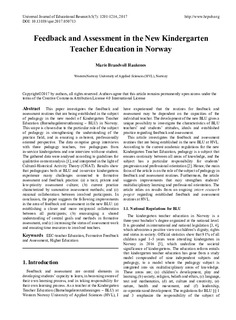Feedback and Assessment in the New Kindergarten Teacher Education in Norway
Peer reviewed, Journal article
Permanent lenke
http://hdl.handle.net/11250/2481522Utgivelsesdato
2017Metadata
Vis full innførselSamlinger
Originalversjon
Haukenes MB. Feedback and Assessment in the New Kindergarten Teacher Education in Norway. Universal Journal of Educational Research. 2017;5(7):1201-1214 10.13189/ujer.2017.050713Sammendrag
This paper investigates the feedback and assessment routines that are being established in the subject of pedagogy in the new model of Kindergarten Teacher Education (Barnehagelærerutdanning – BLU) in Norway. This scope is chosen due to the particular role of the subject of pedagogy in strengthening the understanding of the practice field, and in ensuring a coherent, professionally oriented perspective. The data comprise group interviews with three pedagogy teachers, two pedagogues from in-service kindergartens and one interview with one student. The gathered data were analysed according to guidelines for qualitative content analysis [1], and interpreted in the light of Cultural-Historical Activity Theory (CHAT). Results show that pedagogues both at BLU and in-service kindergartens experience many challenges connected to formative assessment and feedback practice: (a) a tacit, private and low-priority assessment culture; (b) current practice characterized by summative assessment methods; and (c) minimal collaboration between involved participants. In conclusion, the paper suggests the following improvements in the area of feedback and assessment in the new BLU: (a) establishing a closer and more reciprocal collaboration between all participants; (b) encouraging a shared understanding of central goals and methods in formative assessment, and (c) increasing the status of assessment work and ensuring time resources to involved teachers.
Beskrivelse
-

